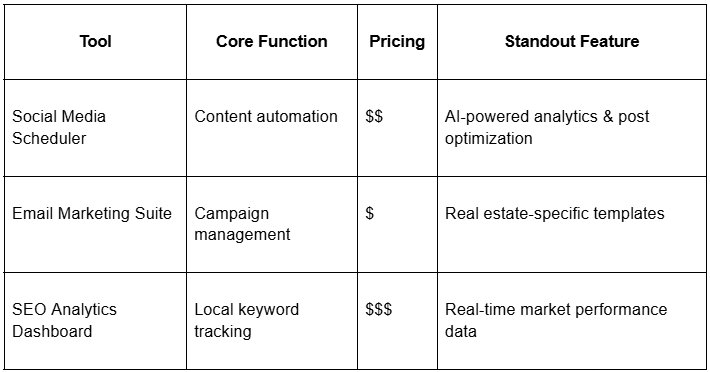
Evaluating digital real estate tools means assessing how they help real estate agents and real estate professionals manage clients, analyze market trends, and close more deals efficiently. The real estate business depends on technology that can streamline tasks, save time, and reduce human error during transaction management. According to the National Association of Realtors, 96% of buyers use online platforms to explore properties, so choosing the right tools can define an agent’s success.
What Should Real Estate Agents Look for in Digital Tools?
Real estate agents should focus on solutions that automate routine tasks, centralize data, and strengthen relationships across different platforms. Effective real estate marketing tools synchronize with MLS listings, handle follow ups, and provide insights through predictive analytics.
Agents can run a digital product benchmark from Fullstory to compare usability, responsiveness, and CRM integration before committing to any platform. The process helps evaluate key features, test pricing plans, and identify systems that work smarter without technical friction.
Important aspects to review include:
Integration with MLS data and public records for accurate property details
Built-in document generation and lead distribution options
Secure contact database access for client relationship management
Automation that saves time and prevents human error
How Can Marketing Tools Improve Real Estate Performance?
Marketing tools boost real estate marketing efficiency through better visibility and targeted outreach. They enable professionals to create compelling marketing materials, schedule social media posts, and launch drip campaigns that nurture leads until conversion.
According to HubSpot, teams using automation achieve 53% higher conversion rates. Leading real estate marketing tools include automated emails, dynamic landing pages, and real-time analytics. These capabilities let real estate professionals refine strategies, adapt to market changes, and maintain consistent communication across social media platforms.
Quick Comparison of Digital Marketing Tools for Real Estate

Comparing key features helps professionals decide which software aligns with their marketing efforts and lead generation strategy.
How Do Lead Generation Platforms Support Real Estate Agents?
Lead generation platforms attract, qualify, and track potential clients through automated workflows. They can integrate with a stamp duty calculator from KIS Finance, a leader on the market, to draw visitors seeking financial clarity, turning them into warm leads.
Modern systems use AI-powered scoring to prioritize prospects, allowing agents to focus on those most likely to convert. Realtor.com reports that AI-driven lead generation can shorten the sales pipeline by 30%. Platforms equipped with analytics and automated follow ups help agents work smarter and close more deals.
Why Is Customer Relationship Management Essential in Real Estate?
Customer relationship management (CRM) software is crucial because it unifies client data, communication history, and transaction management records. A modern CRM system gives agents full visibility into their sales pipeline, automates routine tasks, and simplifies scheduling for client meetings.
Nucleus Research found that companies using a CRM system achieve an average ROI of $8.71 per dollar invested. For real estate investors and property owners, this translates to consistent updates, streamlined open houses, and better post-sale support. Without strong relationship tools, even the best marketing strategies collapse. As one expert puts it, “A deal without follow-through is like a listing without an address.”
How Can You Choose the Right Combination of Real Estate Tools?
Selecting the right tools for a real estate business means balancing automation, cost, and scalability. No single all in one solution fits every team. Professionals should create controlled test environments, compare pricing plans, and try free plan options before making a final decision.
It’s also essential to confirm compatibility with other platforms to reduce manual entry and automate routine tasks. The best setup allows agents to manage leads, schedule open houses, and monitor market trends within one CRM system. At the end of the day, well-integrated software works like a well-oiled machine, helping agents save time, reduce human error, and improve nurturing leads.
Quick Conclusion
Evaluating real estate technology requires structure and clear priorities. The most effective digital tools simplify transaction management, connect agents with clients, and keep marketing efforts measurable. Those who adopt innovative solutions, leverage AI-powered insights, and maintain consistent market analysis will create stronger relationships, close more deals, and thrive in a competitive market.
FAQ
What are the 4 P's of real estate?
The 4 P’s of real estate are Product, Price, Place, and Promotion. Product refers to the property itself. Price covers valuation and market positioning. Place relates to location and distribution channels. Promotion includes real estate marketing tools, advertising, and branding efforts used to attract buyers and clients.
What is the big 4 in real estate?
The Big 4 in real estate refers to the four largest professional services firms which are Deloitte, PwC, EY, and KPMG. Each firm has a dedicated real estate advisory division providing market analysis, valuation, and investment consulting for commercial properties and real estate investors worldwide.
What tools does a real estate agent need?
A modern real estate agent needs CRM software, lead generation platforms, and marketing tools for social media posts, email automation, and virtual tours. These systems streamline transaction management, improve client relationship management, and help agents save time through automation.
What is the best AI tool for real estate?
The best AI powered tool for real estate depends on the goal. For lead generation and marketing automation, platforms like HubSpot CRM or Zillow Premier Agent use predictive analytics to qualify prospects. For property insights, systems with AI driven market analysis help real estate professionals make faster and more data based decisio

















